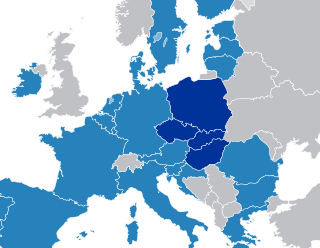
Central Europe is a geographical region of Europe between Eastern, Southern, Western and Northern Europe. Central Europe is known for its cultural diversity; however, countries in this region also share historical and cultural similarities.

The Second Polish Republic, at the time officially known as the Republic of Poland, was a country in Central and Eastern Europe that existed between 7 October 1918 and 6 October 1939. The state was established in the final stage of World War I. The Second Republic ceased to exist in 1939, after Poland was invaded by Nazi Germany, the Soviet Union, and the Slovak Republic, marking the beginning of the European theatre of the Second World War. The Polish government-in-exile was established in Paris and later London after the fall of France in 1940.

Poland, officially the Republic of Poland, is a country in Central Europe. It extends from the Baltic Sea in the north to the Sudetes and Carpathian Mountains in the south, while its longest river is the Vistula. Poland has a temperate transitional climate and is the fifth-most populous member state of the European Union, with its sixteen voivodeships having a total population of over 38 million and covering a combined area of 312,696 km2 (120,733 sq mi). It is bordered by Lithuania and Russia to the northeast, Belarus and Ukraine to the east, Slovakia and the Czech Republic to the south, and Germany to the west. The nation's capital and largest metropolis is Warsaw. Other major cities include Kraków, Wrocław, Łódź, Poznań, and Gdańsk.

Pomerania is a historical region on the southern shore of the Baltic Sea in Central Europe, split between Poland and Germany. The central and eastern part belongs to the West Pomeranian, Pomeranian and Kuyavian-Pomeranian voivodeships of Poland, while the western part belongs to the German states of Mecklenburg-Western Pomerania and Brandenburg.

The Visegrád Group is a cultural and political alliance of four Central European countries: the Czech Republic, Hungary, Poland, and Slovakia. The alliance aims to advance co-operation in military, economic, cultural and energy affairs, and to further their integration with the EU. All four states are also members of the European Union (EU), the North Atlantic Treaty Organization (NATO), and the Bucharest Nine (B9).

Warsaw, officially the Capital City of Warsaw, is the capital and largest city of Poland. The metropolis stands on the River Vistula in east-central Poland. Its population is officially estimated at 1.86 million residents within a greater metropolitan area of 3.27 million residents, which makes Warsaw the 7th most-populous city in the European Union. The city area measures 517 km2 (200 sq mi) and comprises 18 districts, while the metropolitan area covers 6,100 km2 (2,355 sq mi). Warsaw is an alpha global city, a major cultural, political and economic hub, and the country's seat of government. It is also capital of the Masovian Voivodeship.

Eastern Europe is a subregion of the European continent. As a largely ambiguous term, it has a wide range of geopolitical, geographical, ethnic, cultural, and socio-economic connotations. Its eastern boundary is marked by the Ural Mountains, whilst its western boundary is defined in various ways. Most definitions include the countries of Belarus, Russia, Ukraine, Moldova and Romania while less restrictive definitions may also include some or all of the Balkans, the Baltic states, the Caucasus and the Visegrád group.

A voivodeship is the highest-level administrative division of Poland, corresponding to a province in many other countries. The term has been in use since the 14th century and is commonly translated into English as "province".

The Partitions of Poland were three partitions of the Polish–Lithuanian Commonwealth that took place toward the end of the 18th century and ended the existence of the state, resulting in the elimination of sovereign Poland and Lithuania for 123 years. The partitions were conducted by the Habsburg monarchy, the Kingdom of Prussia, and the Russian Empire, which divided up the Commonwealth lands among themselves progressively in the process of territorial seizures and annexations.

The Polish złoty is the official currency and legal tender of Poland. It is subdivided into 100 grosz (gr). It is the most traded currency in Central and Eastern Europe and ranks 21st most-traded in the foreign exchange market.

Polish people, or Poles, are a West Slavic ethnic group and nation who share a common history, culture, the Polish language and are identified with the country of Poland in Central Europe. The preamble to the Constitution of the Republic of Poland defines the Polish nation as comprising all the citizens of Poland, regardless of heritage or ethnicity. The majority of Poles adhere to Roman Catholicism.

The Polish–Lithuanian Commonwealth, formally known as the Kingdom of Poland and the Grand Duchy of Lithuania, or simply Poland–Lithuania, was a bi-confederal state, sometimes called a federation, of Poland and Lithuania ruled by a common monarch in real union, who was both King of Poland and Grand Duke of Lithuania. It was one of the largest and most populous countries of 16th- to 17th-century Europe. At its largest territorial extent, in the early 17th century, the Commonwealth covered almost 1,000,000 km2 (400,000 sq mi) and as of 1618 sustained a multi-ethnic population of almost 12 million. Polish and Latin were the two co-official languages, and Roman Catholicism served as the state religion.

Congress Poland, Congress Kingdom of Poland, or Russian Poland, formally known as the Kingdom of Poland, was a polity created in 1815 by the Congress of Vienna as a semi-autonomous Polish state, a successor to Napoleon's Duchy of Warsaw. It was established when the French ceded a part of Polish territory to the Russian Empire following France's defeat in the Napoleonic Wars. In 1915, during World War I, it was replaced by the German-controlled nominal Regency Kingdom until Poland regained independence in 1918.

The Kingdom of Poland was a monarchy in Central Europe during the medieval period from 1025 until 1385.

The Order of Polonia Restituta is a Polish state order established 4 February 1921. It is conferred on both military and civilians as well as on foreigners for outstanding achievements in the fields of education, science, sport, culture, art, economics, national defense, social work, civil service, or for furthering good relations between countries. It is Poland's second-highest civilian state award in the order of precedence, behind the Order of the White Eagle.

AXN White is a channel operated by Sony Pictures Television International Networks Europe. Its programming is focused on comedy and romantic television series and movies. The channel was launched in Portugal on 14 April 2012 and in Spain on 7 May 2012 replacing Sony Entertainment Television. The channel replaced AXN Crime on 1 October 2013 in Hungary, Poland, Romania, Czech Republic, Slovakia, Bulgaria and Moldova.
Paramount International Networks (PIN) is the international sibling division of Paramount Global’s Paramount Media Networks subsidiary. The division oversees the production, broadcasting and promotion of key Paramount brands outside of the United States. These brands include Paramount Network, Comedy Central, MTV, Nickelodeon, BET and Colors TV, as well as CBS-branded channels, which are co-owned with AMC Networks International. PIN also owned a 30% stake in the Rainbow S.p.A. animation studio in Italy until 2023, as well as a 13.01% stake in an Indian joint venture with domestic partner TV18, Viacom18.
Polsat Comedy Central Extra is a Polish channel focusing on comedy owned by Paramount Networks EMEAA. It was launched on 29 April 2010 as a programming block on VH1 Poland. On 14 January 2011, VH1 Poland was rebranded as Comedy Central Family.

The Armed Forces of the Republic of Poland, Also called the Polish Armed Forces And popularly called Wojsko Polskie in Poland are the national armed forces of the Republic of Poland. The name has been used since the early 19th century, but can also be applied to earlier periods. The Polish Legions and the Blue Army, composed of Polish volunteers from America and those who switched sides from the Central Powers, were formed during World War I. In the war's aftermath, the Polish Army was reformed from the remnants of the partitioning powers' forces and expanded significantly during the Polish–Soviet War of 1920.

AXN Black is a channel operated by Sony Pictures Television International Networks Europe. Its programming is basically focused on action and crime television series and movies. The channel was first launched in Portugal, Angola and Mozambique on May 9, 2011 and replaced Animax. Central European version was launched on October 1, 2013 in Hungary, Poland, Romania, Czech Republic, Slovakia, Bulgaria and Moldova where has replaced AXN Sci Fi.


















